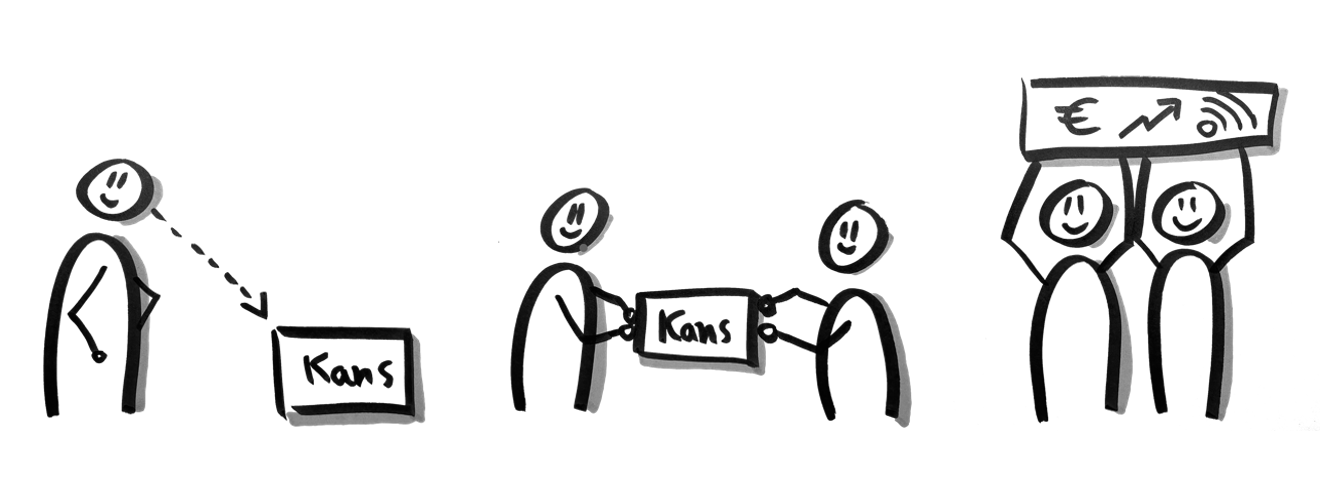Entrepreneurship in organisations: from distrust to trust
In the Netherlands, we have a rich culture of entrepreneurship. We see more and more people taking the plunge and setting up their own business, driven by passion and the will to build something. But entrepreneurship is not only alive among entrepreneurs. Increasingly, managers in organisations are expressing a desire to see more entrepreneurship among their employees. Employees who proactively see opportunities, are creative, and work with the same commitment as if it were their own company-that is a beautiful ideal. But in practice, we often see a gap between what managers expect and what employees experience. Employees say they lack space to be entrepreneurial, while managers would like to see more entrepreneurial behaviour. How can we close that gap and encourage entrepreneurship within the organisation?
What do we mean by entrepreneurship within organisations?
Entrepreneurship, we believe, is about a three-step cycle that every employee can follow in any situation: seeing opportunities, seizing opportunities (together), and creating value. But what does this mean in concrete terms?
- Seeing opportunities
Entrepreneurship starts with an eye for opportunities: opportunities to work smarter, faster or more innovatively. We often see more opportunities than we realise, but awareness requires space. If employees continuously complete their to-do's without any breathing space, little mental space is left to think creatively or look for new solutions. Freeing up time and giving space for reflection and ideas is crucial for employees to think entrepreneurially. - Seizing opportunities (together)
Seeing opportunities is important, but getting started with them is the next challenge. An idea only gains value when action is taken on it. This step takes courage, but becomes more achievable when employees take up opportunities together. By sharing ideas, finding support from colleagues, and asking for space to experiment, the chances of an idea actually being implemented increase. Cooperation plays a crucial role in this phase; entrepreneurship is done together. - Creating value
The final step is to use the picked-up opportunity to add value to the team or organisation. Value can be financial, but also in the form of time savings, job satisfaction or improved quality. Here, a clear vision and goals are very important to be clear about how this new opportunity will add value. By creating added value as a team or organisation, the importance of entrepreneurship becomes visible and experienced.
The role of trust in entrepreneurship and cooperation
Cooperation increases the likelihood of ideas leading to action, but at the heart of cooperation is trust. Without trust, between colleagues and also between managers and employees, it is difficult to develop entrepreneurship. Trust provides the basis on which employees can take responsibility, dare to take risks, and show initiative without fear of sanctions for mistakes.
From distrust to trust
There is often a particular history that feeds distrust: experiences that have undermined trust and make open dialogue difficult. Whether someone can stand criticism often plays a role in this, as does the feeling that sharing this history feels unsafe. Yet there is often a realisation that not sharing experiences leads to distance and a culture of struggling rather than cooperation. The challenge, therefore, is to move towards dialogue and mutual clarity. This step enables entrepreneurship and trust to be built as a team, by focusing not only on the tasks, but also on the cooperation itself.
Building trust and setting clear goals
To encourage entrepreneurship, it is crucial to build trust and create clarity. A good start is to discuss some key questions together:
- What are our goals and our direction?
Are the goals of the entrepreneur and those of the employees in sync, or are there differences between them? By discussing these differences, it becomes possible to work together towards a shared goal. - Who does what? And what should be done as a minimum?
Making mutual expectations clear helps share responsibility and set priorities. This allows employees to hold each other accountable and makes 'not making time' recognisable as a priority choice rather than an obstacle. - Where do we give room for experimentation?
Trust is created when employees are given space to learn, including by experimenting and making mistakes. Delineation is important: what is the boundary of an experiment? Giving trust within a framework gives entrepreneurship room to grow.
When we steer and support from trust instead of controlling from distrust, a work culture is created that enables entrepreneurship. This is a learning process, in which employees and managers learn together to take responsibility step by step and contribute to the bigger picture. Because entrepreneurship within organisations starts with trust.

